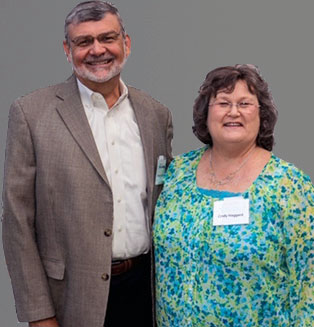Bond-Haggard Endowed Scholarship Opens a World of Potential
After a successful career in both industry and academia, Warren Haggard, Ph.D., has seen a lot of changes in biomedical engineering. Now retired, he says the thing that excites him most about the future of the field is the same thing that excited him as a student—the possibilities.
 Warren and Cindy Haggard created the "Bond-Haggard Endowed Scholarship in Biomedical Engineering" to honor both of their parents for their lifelong support of higher education.
Warren and Cindy Haggard created the "Bond-Haggard Endowed Scholarship in Biomedical Engineering" to honor both of their parents for their lifelong support of higher education.
Haggard earned a master’s degree and Ph.D. in biomedical engineering at UAB, and he leveraged those degrees into a successful career in the medical device industry before moving to the University of Memphis in 2004. Earlier this year, he and his wife Cindy endowed a scholarship to the UAB Department of Biomedical Engineering.
“My Ph.D. advisor at UAB, Dr. Jack Lemons, told me that a biomedical engineering degree is a license to pursue multiple different avenues,” said Haggard. “That’s what is exciting to me about this scholarship. The students who receive it may go in so many different directions.”
Haggard points to his own story as an example. “I was in research and development, but I just as easily could have gone into clinical or regulatory affairs. Others in biomedical engineering go on to professional school in medicine, dentistry or optometry or even law school. The possibilities are almost endless.”
Prepared for Anything
There was no such thing as an undergraduate biomedical engineering degree when Haggard entered Auburn University. Instead, he earned a bachelor’s degree in chemistry in 1978, and he followed that with a master’s degree in biomedical engineering from UAB in 1981.
Immediately after graduating, Haggard received his first lesson in the versatility of a BME degree. “I went to a job fair where I had just a few minutes to convince a company to hire me,” he recalled. “The recruiter said his company didn’t hire biomedical engineers. I told him that even though my degree was biomedical engineering, my coursework focused on materials science, so I had learned quite a bit about corrosion and its effects on materials. That was enough to talk myself into a job with Union Carbide’s Eveready Battery Division.”
Haggard spent a few years as a battery engineer with that company, working on the research and development of lithium batteries. In 1985, he moved back south to take a job in medical devices with Dow Corning Wright in Tennessee. There, he worked as a product development engineer of small joint orthopedics—specifically fingers and toes.
“When I got into the biomedical world, we were creating implants with metal and plastic, but it was clear that biological solutions would eventually become the treatment of choice,” Haggard said. “I knew to keep up with the industry, I needed more background on the cellular level and biomaterial interactions.”
With the company’s support, Haggard returned to UAB to study under Dr. Lemons. After two years of classes and research, he returned to his industry job and wrote his dissertation while working full time.
Throughout the 1990s, Haggard worked in a variety of roles as manager and director before ascending to multiple vice president positions. He joined the University of Memphis in 2004 as a Professor and spent his last three years there as Associate Dean for Research.
A Premium on Education
With a CV that shows pages of degrees, honors, and academic papers, it is clear that Haggard places a high value on education. Yet when he and his wife decided to endow a scholarship at UAB, it wasn’t their names they wanted on the endowment. Instead, the “Bond-Haggard Endowed Scholarship in Biomedical Engineering” is named in honor of both of their parents.
“Both my parents and Cindy’s parents were very supportive of higher education,” Haggard said. “Her dad had a Ph.D. from Auburn. My father had gone to college on the GI bill, and my mother had something close to an associate’s degree. So they understood how an education could open doors.”
By making his gift to the BME department, Haggard says he is confident the recipients will make the world a better place. “Being a biomedical engineer is tough no matter what field you enter,” Haggard said. “UAB has a great program with an active entrepreneurial program. The students get the kind of exposure they need to know the biology and clinical situations and needs, and they also get the engineering background they need to solve the problems of the future.”